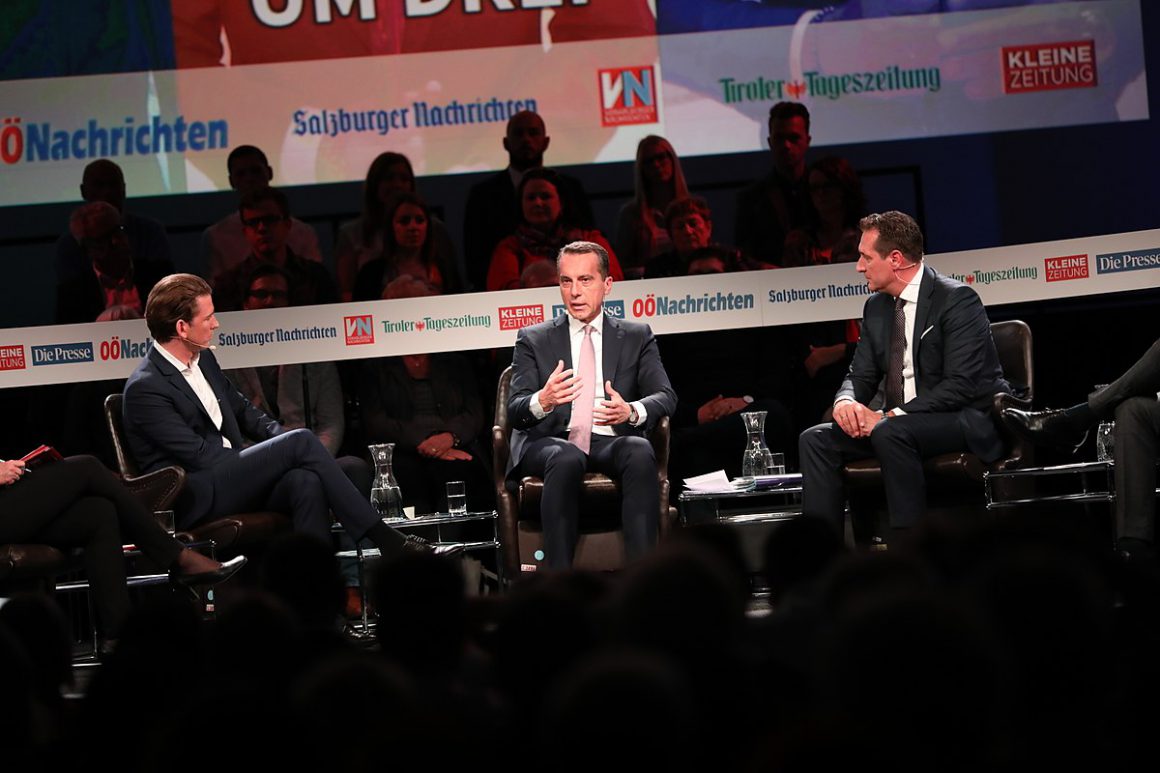Smear campaigns, threats and leaks: Austria’s general election campaign was not only the country’s longest ever, but its dirtiest too.
Austria’s recent general election (15 October) saw the longest ever campaign in the country’s history (discounting the four times voters were called to the ballots to choose their president in the preceding year). The SPÖ (Socialist Party of Austria, S&D) and ÖVP (Austrian People’s Party, EPP) had been in coalition governments for decades, on and off, and both had allied with the nationalist FPÖ (Freedom Party of Austria, ENF).
After just barely scraping together the seats to form another grand coalition in 2013, Christian Kern took over the SPÖ earlier last year, catapulting his party into a secure first place in the polls. But his success was short-lived, as the ÖVP also replaced their head with young Sebastian Kurz, who swung the polls in his favour in an instant and immediately called for new elections.
While it could be said that the governing parties SPÖ and ÖVP have been preparing for new elections for much longer, we officially found out about the early elections in early May. This meant almost six months of exhausting campaigning, both for the parties and the citizens, who had already endured a lengthy competition in the 2016 presidential elections.
One might have expected such a long campaign to allow each party to delve deeper into their policies and explain their plans to the electorate in detail. Instead, citizens were forced to endure a never-ending cycle of repetitive platitudes and attempts to justifying stances that were never convincing.
If that was not enough to make voters sick and tired of politics, we also were treated to one of the biggest dirty-campaigning scandals to date, surrounding Chancellor Kern and his social democratic party SPÖ, with some evidence suggesting that the conservative ÖVP’s lead candidate and Foreign Minister Kurz also tried to bribe one of the SPÖ’s contractors to spy on them for him.
Kern denied any involvement in the plot to undermine his rival Kurz through the use of defamatory social media pages. These pages also gave rise to racist and anti-Semitic sentiments in a likely attempt to pin their origin on the nationalist FPÖ. Instead of apologising, Kern proclaimed himself another victim, pointing to a similar social media page that attacked him. The SPÖ even went so far as to press charges against the unknown party.
The perpetrator? The Israeli Tal Silberstein and his team. Silberstein has been a campaign adviser to many different parties across multiple countries and is an expert on dirty campaigning.
In January 2017 Romania launched an investigation into Silberstein’s alleged money laundering activities. Kern defended him vehemently at that time and called the allegations bogus. Silberstein was arrested in Israel in August, at which point the SPÖ cut all ties with him.
The defamatory Facebook pages, however, remained active well beyond that and were only shut down shortly before the election. Silberstein’s team in Austria seemed to remain fully operative even without him, which begged the question of who was paying them. The SPÖ denied having any involvement in the matter, yet still let go its federal whip, Georg Niedermühlbichler.
One of Silberstein’s co-workers, Peter Puller, who had close ties to the conservative ÖVP, later came forward with an accusation that one of Kurz’s close advisers offered him €100,000 to switch sides and “return to the fold”. The ÖVP of course denied this.
Just a few days later, the Austrian boulevard paper Die Kronen Zeitung revealed screenshots of a WhatsApp conversation between Silberstein’s translator (yes, the chancellor needed a translator so he could communicate with Silberstein in English) and the Chancellor’s speech-writer and adviser Rudi Fußi. The conversation was really a monologue comprised of threats and attempts at bribery and intimidation.
It turns out that the translator was responsible for leaking many of the connections between the social democrats and the Silberstein campaign to the press. Fußi not only confirmed the authenticity of the report, he also went on Twitter and continued to offer €30,000 to anyone who could provide proof that his private emails had been sold to third parties (leading back to other far more minor leaks from both the SPÖ and ÖVP about internal strategy papers and analyses). The SPÖ disavowed Fußi and claimed they had no control over him or his actions.
During the campaign, an internal SPÖ document prepared to brief Silberstein on the SPÖ’s situation was leaked to the press. It contained an assessment of Kern’s personality and called him unfit to lead, an emotional wreck and “a princess”, a nickname that would stick for the remainder of the campaign.
The Austrian public prosecution department found out after the election that Puller was indeed the administrator of the Facebook pages dedicated to smearing Kurz’ name.
As for the page attacking Kern, an ex-employee of the ÖVP came forward and confessed he was behind it. Although he claims it was not connected to or funded by the party and he launched the page himself, in response to the SPÖ’s pages. The SPÖ has not commented thus far and it remains to be seen, whether or not they will continue their lawsuit.
All pages have since been deleted.



